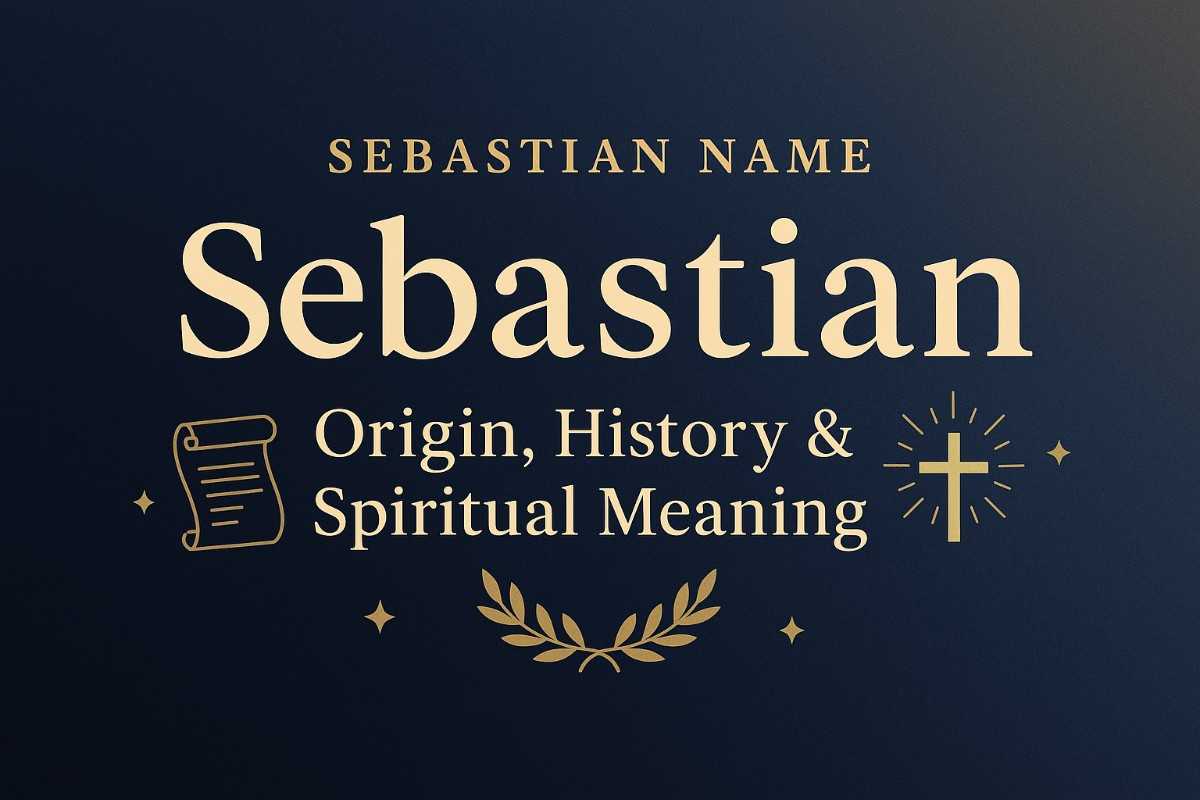Names carry stories. They hold history, culture, and sometimes faith. Some names feel timeless. Others move in and out of fashion like trends. Sebastian is one of those names that has held its ground for centuries. It’s strong, elegant, and widely loved.
Parents often choose Sebastian because it sounds classic yet modern. It also has many short forms and nicknames that feel casual and fun. But what does Sebastian really mean? Where did it come from? And does it carry spiritual or biblical weight? Let’s explore step by step.
What Does the Name “Sebastian” Actually Mean?
Sebastian comes from the Latin name Sebastianus. It described someone from the city of Sebaste. Sebaste itself comes from the Greek word sebastos, which means “venerable” or “revered.” So at its core, Sebastian points to respect, honor, and dignity.
Over time, the name took on a broader meaning. It became linked with noble qualities and a sense of pride. Even today, Sebastian feels refined and graceful. It works well in many cultures, which explains its lasting popularity.
The Origin and Definition of the Name “Sebastian”
Origin:
Sebastian traces back to ancient Greece and Rome. The Greek word sebastos was a title given to honor someone. Romans later adopted it. The name spread across Europe through early Christian saints and historical figures. By the Middle Ages, it was firmly rooted in Christian tradition and Western culture.
Definition:
Sebastian means “venerable,” “revered,” or “honorable.” It suggests someone worthy of respect, someone set apart with dignity.
Spiritual Meaning of the Name “Sebastian”
Sebastian has strong ties to faith, especially in Christianity. One of the most famous saints, Saint Sebastian, was a Roman soldier who converted to Christianity. He was known for his courage, loyalty, and sacrifice. His story spread across Europe, making the name even more powerful.
Spiritually, Sebastian often represents bravery in the face of hardship. It carries the sense of endurance, faith, and protection. Many people see it as a name tied to inner strength and resilience. Parents who want a meaningful, faith-rooted name often turn to Sebastian for this reason.
What Is the Meaning of “Sebastian” in the Bible?
The Bible does not mention Sebastian directly. Still, it became popular through early Christian tradition. Saint Sebastian’s story appears in historical texts, not in scripture. Yet the themes connected to him—faith, courage, and devotion—fit well with biblical values.
Some Christians also link Sebastian with the idea of being “set apart” for God. The meaning “venerable” or “worthy of respect” feels in line with how scripture describes people chosen for a higher purpose.
So while the Bible does not list Sebastian by name, its spiritual connection is strong.

Discover More: Chase – Meaning, Origin & Nicknames of the Name
25 Top Popular Nicknames for the Name “Sebastian”
One of the best parts about Sebastian is the wide range of nicknames it allows. Whether formal or playful, there’s something for everyone.
| Nickname | Meaning and Origin |
|---|---|
| Seb | Short, simple form |
| Sebby | Cute, childlike version |
| Bastian | Strong, stylish twist |
| Bash | Fun, modern sound |
| Bas | Dutch and German roots |
| Baz | Popular in the UK, lively feel |
| Ian | From the ending of Sebastian |
| Sian | Variant inspired by Welsh names |
| Sebo | Friendly, casual tone |
| Sebs | Plural style nickname |
| Ash | From the middle letters, trendy |
| Asti | Italian-sounding, soft |
| Tino | Common in Spanish versions |
| San | From “Sebastian,” sleek and short |
| Sabo | Warm and playful |
| Bastie | Sweet and gentle version |
| Baso | Spanish influence |
| Bashi | Lighthearted, easy to say |
| Bassy | Musical and catchy |
| Tian | Pulled from the ending |
| Stian | Scandinavian form |
| Seba | Popular in Spanish-speaking countries |
| Seban | Unique twist on the name |
| Baza | Slavic touch, friendly |
| Bast | Ancient, sharp, and bold |
These nicknames make Sebastian versatile. A child can start with Sebby or Bash. As he grows, he might prefer Bastian or Ian. The name moves easily across ages and cultures.
The Meaning of “Sebastian” in Hebrew
Hebrew has no direct version of Sebastian. Still, many Christian communities used the name in Hebrew-speaking regions. When adapted, Sebastian often connects with the Hebrew idea of respect and reverence.
Some see a link between Sebastian and Hebrew words like kavod (honor) or yare (to fear, in the sense of deep respect). While not a literal translation, the meaning of “revered” matches the Hebrew focus on honor and dignity.
In practice, Hebrew speakers usually use Sebastian as-is. It holds the same strength and elegance across languages.
Conclusion
Sebastian is more than a name—it’s a story that spans centuries. It started in ancient Greece, moved through Rome, and became tied to faith through Saint Sebastian. Its meaning, “venerable” or “revered,” still feels powerful today.
Parents love it because it’s formal yet flexible. With dozens of nicknames, it suits both children and adults. Spiritually, it carries the weight of courage, faith, and respect. Even without a direct biblical reference, it resonates deeply in Christian tradition.
So, what’s the takeaway? Sebastian is a name that balances history and modern charm. It works across cultures, languages, and faiths. If you’re looking for a name with meaning, strength, and style, Sebastian stands tall.

Cala Joy is a wellness coach, breathwork facilitator, and passionate explorer of heart-centered living. Her articles focus on emotional healing, energy alignment, and creating a life led by love and intuition.

